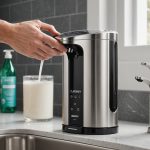In a rapidly evolving culinary landscape, restaurants face the challenge of enhancing customer experiences while respecting privacy. Innovative tactics utilizing data can transform service personalization, creating memorable dining experiences. By harnessing insights without compromising customer trust, establishments can foster loyalty and ensure satisfaction. This exploration highlights effective strategies that marry data-driven decision-making with ethical practices, paving the way for a new era in hospitality. Discover how restaurants can elevate their offerings and nurture meaningful connections with patrons.
Advanced Data Analytics Strategies for Restaurants
Exploring the potential of data analytics in the restaurant industry can lead to significant improvements in the overall customer experience. By effectively implementing restaurant strategies focused on data, businesses can gain insights into customer preferences and behaviors.
In the same genre : Enhancing culinary experiences: the art of scent marketing in restaurants for an irresistible atmosphere
Techniques for Collecting and Analyzing Customer Data
Understanding how to collect and analyze customer data is crucial for any restaurant aiming to enhance its service. Utilizing tools like point-of-sale systems, loyalty programs, and online reservations can provide valuable data points. Restaurants can then employ advanced analytics software to interpret this information, identifying patterns and trends that inform strategic decisions.
Leveraging Data to Enhance Customer Service and Personalization
By leveraging data analytics, restaurants can offer a more personalized dining experience. For instance, analyzing past orders can help create tailored menu suggestions, while feedback analysis can improve service quality. This not only boosts customer satisfaction but also fosters loyalty.
Have you seen this : Cultivating customer loyalty: proven tactics for restaurants to boost retention through winning loyalty programs
- Benefits of Data Analytics in Restaurants:
- Improved menu offerings
- Enhanced customer engagement
- Increased operational efficiency
Implementing these restaurant strategies effectively requires a commitment to understanding and utilizing data. By doing so, restaurants can not only meet but exceed customer expectations, driving both satisfaction and profitability.
Case Studies of Successful Implementations
Exploring real-world examples of restaurants that have embraced data-driven strategies can offer valuable insights into their success. These case studies showcase the tangible benefits of data analytics in enhancing customer satisfaction and loyalty.
Case Study: The Gourmet Bistro
The Gourmet Bistro, a well-known restaurant, implemented a comprehensive data analytics system to track customer preferences. By analyzing data from their loyalty program, they identified popular dishes and adjusted their menu accordingly. This led to a 20% increase in repeat customers and a significant boost in customer satisfaction.
Case Study: Urban Eats
Urban Eats utilized data analytics to streamline operations and improve service delivery. By examining feedback data, they identified areas for improvement and trained staff accordingly. This resulted in a 15% increase in customer loyalty and a noticeable enhancement in service quality.
Key Takeaways from Successful Case Studies
- Data-driven strategies can significantly improve customer satisfaction and foster loyalty.
- Analyzing customer feedback is crucial for identifying service improvement areas.
- Tailoring menu offerings based on data insights can attract more repeat customers.
These success stories highlight the importance of investing in data analytics to stay competitive and meet evolving customer needs. By learning from these examples, restaurants can implement effective strategies to enhance their operations and customer experience.
Balancing Personalization with Privacy Compliance
Navigating the landscape of data privacy regulations is essential for restaurants aiming to offer personalized experiences. Current laws, such as GDPR and CCPA, mandate strict controls on customer data usage. These regulations require businesses to obtain explicit consent before collecting personal information, ensuring transparency and accountability.
To personalize customer experiences while maintaining privacy compliance, restaurants can adopt various strategies. Implementing anonymization techniques can help in using data insights without compromising individual identities. Additionally, offering customers control over their data preferences enhances trust and engagement.
Tools and Technologies
Utilizing the right tools is crucial for compliance with privacy standards. Many restaurants are turning to advanced software solutions that integrate seamlessly with existing systems. These tools facilitate secure data storage and offer robust encryption methods.
- Data Anonymization: Ensures privacy by removing identifiable information
- Encryption Software: Protects data during transmission
- Consent Management Platforms: Automate consent collection and preference management
By focusing on compliance and employing innovative technologies, restaurants can effectively balance personalization with data privacy. This approach not only aligns with current regulations but also fosters a trustworthy relationship with customers. Prioritizing privacy compliance is not just a legal necessity but also a strategic advantage in enhancing customer loyalty and satisfaction.
Best Practices for Data Management in the Restaurant Industry
Implementing effective data management strategies is crucial for restaurants seeking to maintain data security and enhance operational efficiency. Ensuring robust data governance is the first step towards responsible data handling.
Importance of Data Governance and Security
In the restaurant industry, data security is paramount to protect sensitive customer information. Adopting comprehensive data governance frameworks helps in establishing clear protocols for data collection, storage, and usage. This reduces the risk of breaches and fosters customer trust.
Best Practices for Managing Customer Data Responsibly
To manage customer data responsibly, restaurants should prioritize the following practices:
- Regular Audits: Conduct frequent assessments to ensure compliance with data protection laws.
- Data Minimization: Collect only essential customer information to reduce exposure.
- Access Controls: Implement stringent access controls to limit data access to authorized personnel.
Recommendations for Training Staff on Data Management and Privacy
Training staff is essential to uphold data security standards. Effective training programs should cover:
- Data Privacy Protocols: Educate staff on privacy laws and internal data handling procedures.
- Incident Response Plans: Prepare employees to respond swiftly to data breaches.
- Continuous Learning: Encourage ongoing education to keep abreast of evolving data management trends.
By adhering to these best practices, restaurants can enhance data security and ensure responsible data management, ultimately building a strong foundation for customer trust and business success.
Actionable Insights for Restaurant Owners and Managers
Implementing data analytics strategies in daily operations can significantly enhance restaurant management. By integrating analytics into routine tasks, owners and managers can make informed decisions that boost customer engagement.
Tips for Implementing Data Analytics
Understanding how to use data effectively is crucial. Here are essential tips:
- Start Small: Begin with manageable data projects, such as tracking popular menu items.
- Use Technology: Invest in analytics software that suits your restaurant's size and needs.
- Regular Reviews: Consistently evaluate data to identify trends and adjust strategies accordingly.
Engaging Customers Through Data-Driven Loyalty Programs
Loyalty programs are a powerful tool for fostering customer engagement. By analyzing customer data, restaurants can create personalized rewards that resonate with diners. This not only increases repeat visits but also strengthens brand loyalty.
Continuous Improvement Through Feedback and Data Analysis
Ongoing improvement is key to success. By systematically gathering and analyzing customer feedback, restaurants can pinpoint areas for enhancement. This iterative process ensures that service quality evolves in line with customer expectations.
"Data is the new oil. It’s valuable, but if unrefined, it cannot really be used." – Clive Humby
By focusing on these actionable insights, restaurant owners and managers can leverage data analytics to drive customer engagement and improve overall operations.













